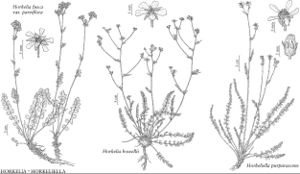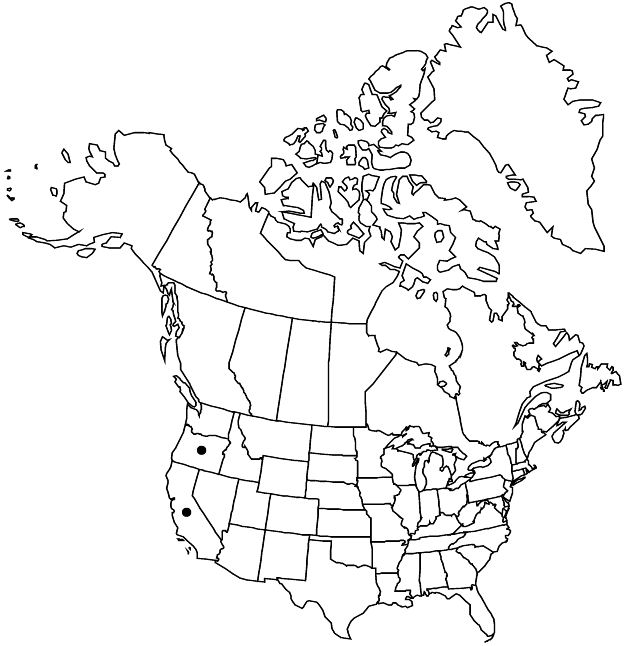Difference between revisions of "Horkelia howellii"
Bull. Torrey Bot. Club 25: 55. 1898.
FNA>Volume Importer |
FNA>Volume Importer |
(No difference)
| |
Revision as of 20:36, 24 September 2019
Plants tufted to openly matted, ± green. Stems ascending to erect, (0.9–)1.5–5 dm, hairs 1 mm proximally, glands absent or sparse distally. Basal leaves ± cylindric to weakly planar, 5–15 × 0.5–1.8(–2.5) cm, usually villous to pilose at least marginally, often glabrescent; stipules deeply 2-lobed or pinnately divided into 3–5 linear to filiform lobes that often form a tangled mass; leaflets 10–15 per side, ± overlapping, elliptic to flabellate, (3–)4–10(–15) × 2–8 mm, 1/2 to as wide as long, divided 1/2–3/4 to midrib into (0–)2–4 elliptic to linear lobes 1–2 mm wide, these not restricted to apex. Cauline leaves (2 or)3–5; stipules 5–12(–15) mm, entire to deeply 2–4-lobed or -toothed (usually on 1 side). Inflorescences open, flowers arranged individually and/or in non-capitate glomerules. Pedicels 1–6(–12) mm. Flowers 10 mm diam.; epicalyx bractlets linear-lanceolate, 1–3 × 0.5 mm, ± 2/3 length of sepals; hypanthium 1.1–1.5 × 2–3 mm, ± 1/2 to as deep as wide, interior glabrous; sepals spreading to reflexed, abaxially green to reddish or purplish, 2.5–4.5 mm; petals white to pink or red-veined, narrowly obcordate, 3–5 × 2–3 mm, apex truncate or emarginate; filaments 0.5–1.7 × 0.2–0.5 mm, anthers 0.4–0.6 mm; carpels 2–6; styles 1.5–2 mm. Achenes brown, 2–2.7 mm, smooth.
Phenology: Flowering summer.
Habitat: Chaparral, oak-conifer woodlands, mainly on serpentine soil
Elevation: 60–1200 m
Discussion
Of conservation concern.
As noted above, Horkelia howellii comprises the bulk of what D. D. Keck (1938) and subsequent floras included in H. sericata, and the range of the latter is fully encompassed within that of the former. As here circumscribed, H. howellii occurs in northwestern California and southwestern Oregon. The handful of collections from Humboldt and Trinity counties, California, including the type of Potentilla laxiflora Drew, have leaves approaching H. daucifolia but the inflorescence of H. howellii; exact petal color is uncertain.
Selected References
None.

